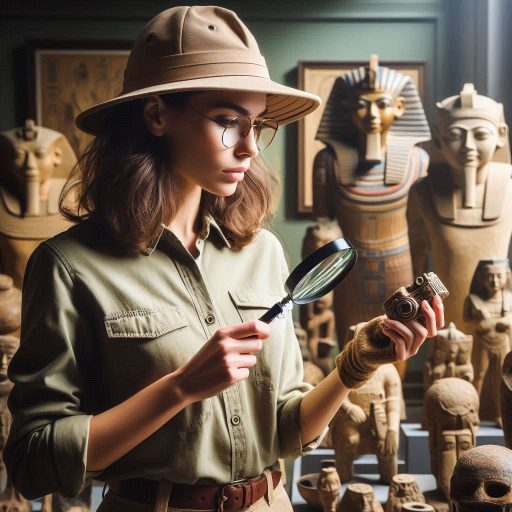Introduction
Anthropologists play a crucial role in modern society by studying human behavior and cultural practices.
They provide valuable insights into how cultures evolve and interact.
In today’s globalized world, understanding diverse cultures fosters empathy and cooperation among people.
Anthropologists address pressing social issues, advocate for human rights, and contribute to cultural preservation.
They study globalization’s impact, promote cross-cultural understanding, and help resolve conflicts.
Their research informs public policy, helping societies adapt to changing circumstances.
This blog post will explore the various roles anthropologists play in contemporary society.
We will discuss their impact on social issues, cultural preservation, and human rights advocacy.
Additionally, we will highlight their collaboration with other disciplines and the ethical considerations they navigate.
By examining these key areas, we will illustrate why anthropologists are essential for understanding and addressing the complexities of human societies today.
Their work not only enhances our knowledge but also fosters social justice and cultural sensitivity.
Through their efforts, anthropologists help us build a more inclusive and understanding world.
Definition of Anthropology and the role of anthropologists
Anthropology as the Study of Human Societies and Cultures
Anthropology is the study of human societies and cultures.
It seeks to understand the complexities of human behavior, beliefs, and practices across different contexts.
This discipline explores what it means to be human, both in the past and present.
Various Subfields within Anthropology
Anthropologists work in various subfields that focus on different aspects of human life.
Cultural anthropology
The cultural anthropology examines social norms, traditions, and values within diverse cultures.
Cultural anthropologists often engage in ethnographic research, which involves living among communities to observe and understand their way of life.
Physical anthropology
Physical anthropology focuses on human biological diversity and evolution.
This subfield studies human anatomy, genetics, and the biological factors influencing behavior.
Physical anthropologists often conduct research on primates and human ancestors to understand our evolutionary history.
Archaeology
The archaeology investigates past human societies through material remains.
Archaeologists excavate sites, analyze artifacts, and reconstruct historical contexts.
Their work provides valuable insights into how ancient cultures lived, interacted, and adapted to their environments.
Linguistic anthropology
The linguistic anthropology explores the relationship between language and culture.
Linguistic anthropologists study how language shapes social identity, group membership, and cultural practices.
They analyze how language evolves and influences human interactions.
Role of Anthropologists in Studying and Understanding Human Behavior and Culture
The role of anthropologists is crucial in studying and understanding human behavior and culture.
They analyze cultural differences and similarities, helping us appreciate the diversity of human experiences.
Their research often informs policies and practices that promote social justice and cultural understanding.
Anthropologists contribute to resolving contemporary issues by applying their knowledge.
They offer insights into globalization, migration, and social change.
By understanding cultural contexts, they help organizations implement effective programs in education, health, and community development.
Moreover, anthropologists serve as advocates for marginalized communities.
They document their struggles and highlight their voices.
This advocacy can lead to greater awareness and support for social justice initiatives.
In modern society, anthropologists also work in interdisciplinary teams.
They collaborate with sociologists, psychologists, and economists to tackle complex social problems.
Their holistic approach enables a comprehensive understanding of issues like poverty, inequality, and human rights.
Anthropology is a vital discipline that explores the richness of human life.
Anthropologists play a key role in understanding diverse cultures and societies.
Through their work, they foster a deeper appreciation of humanity’s complexities, ultimately contributing to a more inclusive world.
Impact of Anthropological Research on Society
Addressing Social Issues and Conflicts
Anthropological research plays a vital role in addressing social issues and conflicts.
By examining cultural practices and social dynamics, anthropologists identify root causes of societal problems.
They analyze how historical injustices and power imbalances contribute to contemporary conflicts.
This understanding enables stakeholders to address issues more effectively.
Anthropologists often investigate topics like poverty, inequality, and migration.
Their research provides insights into how these issues affect different communities.
By highlighting cultural nuances, anthropologists help policymakers craft targeted interventions that respect local contexts.
Working with Communities to Develop Solutions
Anthropologists actively collaborate with communities to develop solutions to societal problems.
They engage in participatory research, which involves community members in the research process.
This approach empowers communities to share their perspectives and contribute to finding solutions.
For example, anthropologists work with indigenous groups to address land rights issues.
They document traditional land use practices and cultural significance.
This documentation aids communities in advocating for their rights and securing legal protections.
Furthermore, anthropologists facilitate dialogue between conflicting groups.
They use their knowledge of cultural practices to mediate discussions.
This mediation can help reduce tensions and foster understanding among diverse communities.
Influencing Public Policy and Social Change
Anthropological research has significantly influenced public policy and social change.
Policymakers often rely on anthropologists’ insights to develop effective programs.
For instance, anthropological studies on health care access inform public health initiatives.
By understanding cultural beliefs surrounding health, policymakers create tailored interventions that improve community engagement.
One notable example is the work of anthropologists in disaster relief.
After natural disasters, they assess community needs and cultural contexts.
Their research helps organizations deliver aid that aligns with local customs.
This culturally sensitive approach enhances the effectiveness of relief efforts.
Another impactful example involves education reform.
Anthropologists conduct research on classroom dynamics and learning styles.
Their findings inform the development of culturally relevant curricula.
Such curricula promote inclusivity and improve educational outcomes for marginalized students.
In addition, anthropologists contribute to environmental policy discussions.
They examine the cultural dimensions of environmental issues, such as climate change.
By understanding how communities interact with their environment, anthropologists advocate for sustainable practices that respect local traditions.
Anthropological research significantly impacts society by addressing social issues and conflicts.
Anthropologists work closely with communities to develop effective solutions.
Their findings influence public policy and drive social change, ultimately fostering a more equitable and inclusive society.
Through their dedication to understanding human behavior, anthropologists promote positive societal transformation.
Read: Top Skills Needed for a Successful Geology Career
Cultural preservation and heritage conservation
Preserving and Documenting Cultural Knowledge
Anthropologists play a crucial role in preserving and documenting cultural knowledge and heritage.
They conduct extensive fieldwork to collect oral histories, traditions, and customs.
This documentation helps ensure that valuable cultural practices are not lost over time.
By recording languages, rituals, and art forms, anthropologists contribute to the cultural archive.
Anthropologists also create detailed ethnographies that capture the complexities of human societies.
These comprehensive accounts provide insights into social structures, belief systems, and daily life.
By sharing their findings through publications and exhibitions, they raise awareness of diverse cultures.
This dissemination of knowledge fosters appreciation and respect for different cultural identities.
Importance of Cultural Preservation
Cultural preservation is vital for maintaining diversity and promoting understanding among different cultures.
As globalization intensifies, many unique cultural practices face extinction.
Preserving these traditions helps sustain the richness of human experience.
It allows future generations to connect with their heritage and understand their roots.
Cultural preservation also fosters intercultural dialogue and respect.
By learning about different cultures, individuals can break down stereotypes and misconceptions.
This understanding promotes harmony and coexistence among diverse communities.
When people appreciate cultural differences, they are more likely to collaborate on shared challenges.
The role of anthropologists in working with indigenous communities
Anthropologists work closely with indigenous communities to protect their cultural heritage.
They prioritize the needs and perspectives of these communities in their research.
By forming partnerships, anthropologists empower indigenous people to reclaim their narratives.
Through participatory research, anthropologists engage community members in documenting their cultural practices.
This collaboration ensures that the knowledge remains relevant and accurate.
Community-led initiatives often focus on preserving traditional arts, languages, and ecological knowledge.
For example, anthropologists help indigenous groups develop cultural preservation programs.
These initiatives may include workshops to teach traditional crafts or storytelling sessions to pass down oral histories.
By fostering pride in cultural heritage, they encourage community resilience.
Furthermore, anthropologists advocate for the rights of indigenous communities to protect their cultural heritage.
They work to raise awareness about the importance of cultural rights in legal frameworks.
This advocacy can lead to policies that safeguard traditional lands and practices.
Anthropologists also participate in the repatriation of cultural artifacts.
They collaborate with museums and institutions to return items of cultural significance to indigenous communities.
This process fosters healing and reconciliation, allowing communities to reconnect with their heritage.
Anthropologists play a vital role in cultural preservation and heritage conservation.
They document cultural knowledge, promote understanding, and work with indigenous communities.
By advocating for cultural rights and supporting preservation efforts, anthropologists contribute to a more diverse and harmonious world.
Their dedication to cultural preservation enriches society by celebrating the myriad ways people express their humanity.
Read: What Does a Geologist Do? Career Overview and Insights
Human rights and social justice
Advocacy for Human Rights and Social Justice
Anthropologists play a vital role in advocating for human rights and social justice.
They conduct research that highlights injustices faced by marginalized communities.
By documenting their experiences, anthropologists raise awareness of these critical issues.
They collaborate with activists and organizations to amplify voices often silenced in society.
Through their work, anthropologists provide essential insights into systemic inequalities.
They analyze how cultural, economic, and political factors contribute to injustice.
This comprehensive understanding allows them to advocate effectively for policy changes.
Their findings often inform human rights campaigns and social justice initiatives.
Addressing Inequalities Through Research
Anthropological research serves as a powerful tool for addressing societal inequalities.
By employing ethnographic methods, anthropologists gather firsthand accounts of injustice.
These narratives reveal the impact of discrimination, poverty, and violence on individuals and communities.
For instance, anthropologists study the effects of displacement on indigenous populations.
Their research documents the social and cultural consequences of land loss.
This evidence supports advocacy efforts aimed at protecting indigenous rights and land.
Additionally, anthropologists examine issues such as gender inequality, racial discrimination, and economic exploitation.
Their research highlights the interconnectedness of these injustices.
By understanding these relationships, anthropologists develop strategies to address them effectively.
Contributions to Human Rights Causes
Anthropologists have made significant contributions to human rights causes and social movements.
For example, many anthropologists participated in the anti-apartheid movement in South Africa.
They documented human rights abuses and mobilized international support against apartheid policies.
Similarly, anthropologists played a crucial role in the indigenous rights movement.
They helped shape the United Nations Declaration on the Rights of Indigenous Peoples.
Their research provided evidence of historical injustices faced by indigenous communities.
In the field of refugee rights, anthropologists study the experiences of displaced populations.
They advocate for humane policies and practices that protect refugee rights.
Their work informs international organizations about the needs and challenges faced by refugees.
Moreover, anthropologists engage in participatory action research.
They involve communities in the research process, ensuring their voices shape the outcomes.
This approach empowers communities to advocate for their rights and address social injustices directly.
A notable example of anthropological advocacy includes the work of Nancy Scheper-Hughes.
She investigated the organ trade and its impact on vulnerable populations.
Her research led to greater awareness and policy changes regarding human trafficking and organ trafficking.
Another example is the work of James Ferguson, who studied development policies in Africa.
His research challenged conventional approaches to development, advocating for more equitable policies.
His findings influenced social movements fighting against structural injustices.
Anthropologists advocate for human rights and social justice through research and activism.
They address inequalities and injustices by documenting the experiences of marginalized communities.
Their contributions to human rights causes and social movements have made a lasting impact.
By raising awareness and informing policy, anthropologists play a crucial role in advancing social justice worldwide.
Transform Your Career Today
Unlock a personalized career strategy that drives real results. Get tailored advice and a roadmap designed just for you.
Start NowRead: Educational Path: Becoming a Geologist in the USA

Globalization and Cross-Cultural Understanding
Studying Globalization’s Impact
Anthropologists study globalization to understand its effects on societies worldwide.
They examine how global processes shape local cultures and economies.
By conducting fieldwork, anthropologists gather data on cultural changes brought about by globalization.
Their research reveals how traditional practices adapt in response to global influences.
Anthropologists analyze the flow of ideas, goods, and people across borders.
They investigate the complexities of cultural exchange and hybridization.
This research helps them identify patterns of cultural transformation and resistance.
Through their studies, anthropologists uncover the diverse responses of communities to globalization.
For example, anthropologists have explored the impact of global media on local identities.
They examine how cultural products influence perceptions and behaviors.
By understanding these dynamics, anthropologists contribute valuable insights into cultural change.
Importance of Cross-Cultural Understanding
Cross-cultural understanding plays a crucial role in a globalized world.
It fosters empathy and tolerance among diverse populations.
Anthropologists emphasize the need to appreciate different cultural perspectives.
They advocate for respectful engagement with people from various backgrounds.
By promoting cross-cultural understanding, anthropologists help mitigate misunderstandings and conflicts.
They provide tools for individuals to navigate cultural differences effectively.
Their work encourages dialogue and collaboration among diverse communities.
Anthropologists also highlight the importance of recognizing power dynamics in cultural interactions.
They examine how globalization can perpetuate inequalities between cultures.
By addressing these issues, anthropologists advocate for equitable cultural exchanges.
Promoting Cultural Awareness and Sensitivity
Anthropologists actively promote cultural awareness and sensitivity in various settings.
They design educational programs that teach individuals about different cultures.
These programs enhance cultural competence and foster inclusivity in multicultural environments.
In schools, anthropologists collaborate with educators to develop culturally relevant curricula.
They provide resources that reflect diverse perspectives and experiences.
This approach helps students understand and appreciate cultural differences.
In workplaces, anthropologists conduct training sessions on cultural sensitivity.
They equip employees with skills to navigate diverse work environments.
By fostering inclusivity, organizations benefit from diverse ideas and perspectives.
Additionally, anthropologists engage with community organizations to promote cultural awareness.
They organize events that celebrate cultural diversity, such as festivals and workshops.
These initiatives create spaces for dialogue and understanding among different groups.
Anthropologists apply their knowledge of globalization and cross-cultural understanding in various fields.
For instance, in public health, they study how cultural beliefs impact health behaviors.
Their insights inform culturally appropriate health interventions that improve community outcomes.
In international development, anthropologists work to ensure projects consider local cultural contexts.
They advocate for participatory approaches that involve communities in decision-making.
This engagement fosters trust and enhances the effectiveness of development initiatives.
Anthropologists study globalization to understand its effects on societies.
They promote cross-cultural understanding to foster empathy and tolerance.
Through their efforts, anthropologists advocate for cultural awareness and sensitivity in diverse settings.
Their work contributes to a more equitable and interconnected world.
Read: Botany Career Fairs and Networking Events
Ethical considerations in anthropological research
Ethical Responsibilities of Anthropologists
Anthropologists hold significant ethical responsibilities when conducting research with human subjects.
They must prioritize the well-being and rights of individuals involved in their studies.
This includes respecting cultural norms and values during research activities.
Anthropologists should build trust with communities to foster open communication.
They need to be transparent about their research objectives and methods.
Importance of Informed Consent
Informed consent is a fundamental ethical principle in anthropological research.
Anthropologists must ensure that participants fully understand the research process.
This includes informing them about the study’s purpose, risks, and benefits.
Participants should voluntarily agree to participate without any coercion.
They have the right to withdraw from the study at any time without consequences.
Confidentiality is another critical aspect of ethical research.
Anthropologists must protect the identities and personal information of participants.
They should anonymize data to prevent unintended disclosure.
Researchers must handle sensitive information with care and respect participants’ privacy.
This commitment fosters trust and encourages participation in future studies.
Data Protection and Ethical Standards
Data protection plays a vital role in maintaining ethical standards.
Anthropologists must comply with legal regulations regarding data handling and storage.
They should securely store research data and limit access to authorized personnel only.
Implementing robust data protection measures helps safeguard participants’ information.
Ethical considerations also extend to the use of research findings.
Anthropologists must avoid exploiting communities for personal gain or profit.
They should strive to benefit the communities involved in their research.
This includes sharing findings in ways that empower participants and promote social change.
Addressing Potential Ethical Challenges
Anthropologists may face various ethical challenges during their work.
They might encounter conflicting interests between their research goals and community values.
Navigating these complexities requires sensitivity and adaptability.
Anthropologists should remain flexible in their approaches to respect community perspectives.
Another challenge involves addressing power dynamics in research relationships.
Anthropologists must be aware of their influence over participants.
They should actively work to minimize power imbalances to ensure ethical engagement.
This involves listening to community voices and incorporating their input into research design.
Additionally, anthropologists may encounter dilemmas related to informed consent in vulnerable populations.
They must carefully consider how to obtain consent from individuals with limited capacity to understand the research.
In such cases, anthropologists should seek guidance from ethical review boards to ensure responsible practices.
Ethical considerations are paramount in anthropological research.
Anthropologists must uphold their ethical responsibilities toward human subjects.
By prioritizing informed consent, confidentiality, and data protection, they ensure responsible research practices.
Addressing potential ethical challenges requires sensitivity and awareness of community dynamics.
By adhering to ethical principles, anthropologists contribute to the integrity and credibility of their field.
Collaboration with other disciplines
Collaboration with Experts in Other Fields
Anthropologists often collaborate with experts from various disciplines.
They work alongside sociologists, psychologists, biologists, and other professionals.
This collaboration enhances their research capabilities and broadens their perspectives.
By engaging with different fields, anthropologists gain a more comprehensive understanding of human behavior and culture.
For instance, anthropologists partner with sociologists to analyze social structures and community dynamics.
Together, they explore how cultural factors influence social relationships.
This synergy enriches their findings and helps them address complex societal issues.
Collaborating with psychologists enables anthropologists to understand cognitive processes within cultural contexts.
Such interdisciplinary approaches lead to deeper insights into human behavior.
Benefits of Interdisciplinary Research
Interdisciplinary research offers significant benefits for addressing societal issues.
It combines diverse methodologies and theories, fostering innovation and creativity.
By integrating various perspectives, researchers can tackle problems more effectively.
For example, addressing public health challenges requires collaboration among anthropologists, biologists, and healthcare professionals.
This collective effort can lead to holistic solutions that consider cultural factors, biological influences, and social dynamics.
Furthermore, interdisciplinary research promotes a more comprehensive analysis of data.
Combining qualitative and quantitative methods enhances research robustness.
Anthropologists can gather rich, contextual data while also analyzing statistical trends.
This dual approach provides a clearer picture of the complexities involved in human societies.
Successful Collaborations in Practice
Numerous successful collaborations illustrate the power of interdisciplinary research.
One notable example is the collaboration between anthropologists and public health officials.
Together, they developed culturally sensitive health interventions to combat disease outbreaks.
By incorporating local knowledge and practices, they ensured greater acceptance and effectiveness of health programs.
Another example involves anthropologists and environmental scientists working together on climate change issues.
They analyze how cultural beliefs and practices influence environmental attitudes.
This collaboration helps create more effective strategies for climate adaptation and mitigation.
By understanding local perspectives, researchers can implement solutions that resonate with communities.
In educational settings, anthropologists collaborate with educators to enhance learning experiences.
They develop culturally relevant curricula that reflect diverse perspectives.
This partnership enriches students’ understanding of global issues and promotes inclusivity.
Collaboration with other disciplines is essential for anthropologists.
By working with experts from various fields, they enhance their research and address complex societal issues.
Interdisciplinary research fosters innovation and provides holistic solutions.
Successful collaborations demonstrate the impact of diverse perspectives in understanding human behavior and culture.
By embracing interdisciplinary approaches, anthropologists can navigate the complexities of modern society more effectively.
Conclusion
Anthropologists play a vital role in modern society.
They study human behavior, cultures, and societies, contributing valuable insights.
Through various subfields, anthropologists address social issues and advocate for human rights.
They collaborate with experts from different disciplines, enriching their research and understanding of complex challenges.
Anthropologists also work to preserve cultural heritage, ensuring diversity and promoting cross-cultural understanding.
Their research influences public policy, leading to meaningful social change.
By engaging with communities, they develop effective solutions to societal problems.
Furthermore, anthropologists navigate ethical considerations in their research, ensuring respect for human subjects.
Their commitment to informed consent and data protection fosters trust within communities.
We encourage readers to explore the significant contributions of anthropologists.
Understanding their work deepens our appreciation of human societies and cultures.
Anthropology offers crucial insights into the world around us.
By recognizing the importance of this field, we can support anthropologists in their mission to create a more equitable and understanding society.
Let us celebrate their efforts and continue to learn from their invaluable research.
[E-Books for Sale]
The Big Book of 500 High-Paying Jobs in America: Unlock Your Earning Potential
$19.99 • 500 High-Paying Jobs • 330 pages
Explore 500 high-paying jobs in America and learn how to boost your career, earn more, and achieve success!
See All 500 High-Paying Jobs of this E-Book
1001 Professions Without a Degree: High-Paying American Jobs You Can Start Now
$19.99 • 1001 Professions Without a Degree • 174 pages
Discover 1001 high-paying jobs without a degree! Unlock career tips, skills, and success strategies for just $19.99!




